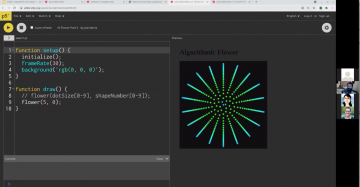As part of the MET Community webinars, a coding workshop series was recently held with Kids Code Jeunesse (KCJ), a Canadian not-for-profit organization based in Montreal, Quebec, that helps children in Canada have an opportunity to learn computational thinking through code. KCJ supports teachers, educators, and parents with workshops that explore different digital tools that provide engaging ways of learning computational literacy and fundamental coding concepts.
I enjoyed the coding workshop because we examined syntax, functions, and libraries for Python and used an online editor and compiler to debug and code T/F and multiple-choice quizzes. This workshop would transfer into a classroom of younger students for a meaningful learning experience.
– David Loti, MET Student

Learning how to create algorithmic art (flower) in P5.js.
Coding, also known as computer programming, can sound intimidating to those who are unfamiliar with the process of designing and building programs to perform specific tasks. Yet basic coding skills are becoming more necessary for teachers, as these are increasingly being taught in schools because of their potential in developing computational thinking and literacy. More teachers are being called to step into the unfamiliarity of coding and discover that it’s not as complicated as it seems. Coding can actually be a fun and engaging experience.
During August and September, there were 5 online workshops led by KCJ instructors Abder Atbi and Kai Hutchence. Attendees learned the basics of Scratch, Python, P5.js, and Micro:bit, and also explored the topic of artificial intelligence and ethics to understand the ethical issues that arise from creating AI algorithms and how to help students understand their roles as digital citizens.
In the Intro to Scratch workshop, I was expecting to spend the hour typing code with a lot of lines, brackets, and characters. Scratch was visually refreshing with its unexpected, from me, block-based codes which are connected like puzzle or Lego pieces. Logical thinking and process has become much more visual since I last used basic coding. The Artificial Intelligence and Ethics workshop helped participants expand their consideration of where we are already encountering AI, whether we realize it or not! We also learned about biases and the importance of diversity and inclusion in designing and building AI.
– Joni Sharkey, MET student
Overall, these workshops were a fantastic opportunity to have a first experience with coding and understand the fundamental principles behind it. It also allowed participants to recognize how, in an educational context, it affords the development of essential skills to succeed in our modern era, such as problem-solving, resilience, concept connection, synthesizing/creative thinking, computational thinking.